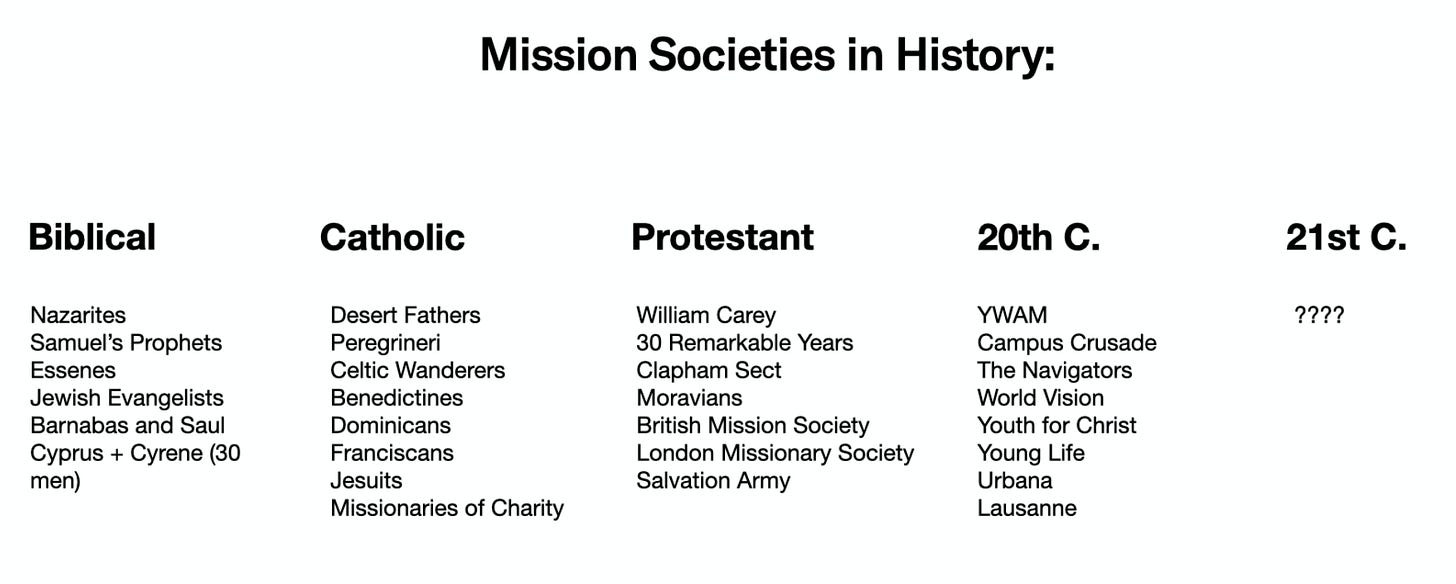Welcome to our journal. We write for church and ministry leaders interested in the macro-trends (innovation, tech, culture, etc) shaping our world. We’ve got more content coming on Web3 - but first wanted to announce a big project.
Let us know what you think, subscribe, and share!
Tyler Prieb / Missional Labs
Launching our incubator
We’re excited to announce the recent beta launch of our new incubator program, and our first cohort of fellows.
One of the dreams in our heart when we started Missional Labs was to become a “greenhouse” for a new generation of ministries and ventures.
We’re in a cultural transition, and our hypothesis is that it’s a ripe moment for renewal and new growth. We think that the ideas that will shape the future of the Church haven’t been built yet.
We’ve been building a 21st-century venture ecosystem for strategic Kingdom projects. Our incubator will aim to become a flagship program for new initiatives, that we hope will bring fresh vision to how the Church engages faithfully with modern culture.
What are Missional Ventures?
We think of missional ventures as being specialized, entrepreneurial projects that thoughtfully leverage modern means (technology, media, networks, etc) for “missional” ends, like evangelism, discipleship, leadership formation, and church planting.
We’re leaning on a few key concepts here as our foundations:
One is on the idea of the “apostolic” leadership function, which Alan Hirsch has written about extensively, among many others. This is where entrepreneurship lives in the body of Christ. The operation of this gift in the church expresses itself as a pioneering spirit, and this instinct is fundamental to innovation, growth, and renewal. It shows up most in moments like ours. We have to nurture it.
The second is the need for specialized ministries. In the 1970’s, missiologist Ralph Winter 1 wrote a seminal paper on the “Two Structures of God’s Redemptive Mission” where he argued that in history, the apostolic impulse has organized for mission in forms that can specialize and scale around a ministry goal.2 He calls these sodalities. We call them “para-church” ministries, but that’s a bit of a misnomer, because they are core to the missio dei. We have to freely empower new forms and structures of scalable ministry, in tandem with local churches.
You can see a quick view of what these other “structures” have looked like through history:
Third is the power of “dense networks” as critical to catalyzing renewal, sparking innovation, and amplifying good ideas. We’ve written before on the idea of dense, creative networks as being foundational to innovation. As Walter Isaacson says in The Innovators, "The key actor in history is not individual genius, but rather the network, and the new institutions that are created out of those networks.” We believe that in a global, digital age, it’s going to be dense, interdisciplinary, passionate cohorts of ministry friends that create the future.
Finally, we see ourselves in the larger missions tradition that goes back from the Lausanne gatherings, to the post-war missions movement, the 1910 Edinburgh conference, the Victorian-era missionary societies, and even back to previous eras of missionary organization. The primary goal here is the mobilization of missionary leaders to the frontiers of the age, and the ends of the earth, for the sake of the Gospel encounter and renewal.
21st Century Opportunity
So we’ve been asking, “where are the missional projects that will innovate and shape how the Church engages culture in the 21st century?”
We think there is a gap, and an opportunity, here. The reason we haven’t seen much missional innovation recently is due to a number of converging trends. Here are a few:
The “aging” of the 20th century missions movement. Many of the specialized organizations that we reference today were started in a post-war boom era, and grew rapidly as they served in parts of the world that were seeing major growth of the Church. We still mostly reference ministries that are 40+ years old when we talk about “missions” organizations (think YWAM, Cru, etc), and many of them have origin stories in the growth years of churches in the east or south (i.e., post-war Russia, Latin America or African pentecostalism, etc), rather than the modern moment. What’s more, the postmodern / postcolonial mood has led to a western Christianity that has been decidedly “local,” and much more content to focus on the contemplative spirituality and reaching the neighborhood, than going to the ends of the earth.
Hyper-focus on church planting. With that, in the West, most of the entrepreneurial resources of the last 20 years (and Gen-X as a cohort) have gone into planting local churches. This is an apostolic task to be sure, but it is focused exclusively on replicating new congregations (often with a fixed model) rather than imaginative pioneering of diverse types of ministry in new contexts. Many apostolic leaders that aren’t typical “church planters,” end up having to create separate structures around their core gifting, because churches and denominations don’t have the ability to contain them operationally - which is why we often see “evangelists,” “prophets,” and the like with their own independent and itinerant organizations around them. This isn’t bad, but isn’t fully optimized and healthy.
The secularization of the charitable sector. Historically, much of the work of missionary societies was aimed at mercy, justice, and charity, along with evangelism and church work. In our time, most charitable activity in the public square has shifted into primarily secular paradigms, which can limit the scope of their mission, funding, or how religious they can be. The move toward social enterprise has been an innovation, but it often has to aim at broad kingdom ends (“human flourishing”) with secular assumptions and limits. Many Christians still serve well in this space, but it creates a fundamental tension in how they organize, and limits some of the Christian talent pool.
The rise of the entrepreneurial and creator economy. More optimistically, it’s never been easier to build a product, start a business, or gather a community than it is today. Entrepreneurialism is everywhere, and the venture ecosystems that support it seem to be multiplying rapidly (see below). New organizational forms are emerging in real time. Most entrepreneurial “talent,” even among Christians, is more likely to find its way into the private sector than into vocational ministry, because the pathways and incentives don’t really exist. But, the global church is a huge opportunity for social innovation - it’s never been a better time to start something, and even Silicon Valley is starting to notice.3
Our Incubator Program
We’re aiming to put our incubator into this space. Our incubator is a 6-month, cohort-based experience for new missional ventures.
For round one, we’ve selected up to 15 “fellows” from around the world, and invited them to a 24-week virtual program. It’s designed to equip them with a clear vision, framework, and roadmap to validate their idea and turn it into a viable ministry.
We’re currently in our proof of concept, which is virtual only. But eventually, the program will gather in 3 cities - New York, London, and a rotating third city - which will create the backdrop for deep reflection and learning on how to build ventures that embody a missionary encounter in our cultural frontiers.
The curriculum will be a “ministry design” framework that we’re creating, which integrates the best of startup principles, while anchored in missiology and spiritual formation.
Through the zoom calls, peer learning, and mentor support, we’ll help emerging leaders develop their concept and build an effective missional organization.
We’ve got a great first cohort of projects, with fellows working in New York, London, Baltimore, Vancouver, Los Angeles, San Diego, Beirut, Durban, Philadelphia, Portland, and more.
You can see more on the fellows and their projects here.
Get Involved
We’re looking for some program support to get the program going. Here’s what we would love help with:
Mentors. We’re building our network of mentors and experts who are willing to come alongside these projects and help them toward maturity.
Creatives. We’d love to build out a talent network of designers, developers, marketers, artists, and other creative professionals in a talent pool.
Funders. If you, someone you know, or any philanthropic organizations want to get behind a new wave of kingdom projects, we’d love to talk to you!
New Ventures. If you know an emerging leader that is pioneering something interesting, anywhere in the world, have them fill out the interest form at the top of this page.
If this is you, or you want to connect, email us!
Thanks for reading.
1) About the Missional Labs Journal:
Our journal a digest of articles and ideas on innovation, culture, and leadership, translated for ministry leaders pioneering the church in the modern world.
2) Explore our digital community:
We’re beta testing a digital network for emerging missional leaders, for conversations around leadership, culture, innovation, and mission. If you’re a ministry leader under 40-ish (pastor, church planter, creative staff, technologist, nonprofit staff, etc), and you’re interested, let us know.
3) Got an idea? Join our incubator:
We’re launching an incubator program for Church-adjacent entrepreneurs and ventures. You might have that technology project, media project, or new ministry that you think the world needs. We’ll help you get it going. Email us for information.
4) Work with our innovation team:
This content is part of our interdisciplinary services team that partners with Churches, nonprofits, networks, and other missional organizations. We do full-service strategy and innovation work for leaders navigating change and building the future. We can help - say hello.
Winter is the well-known 20th century missiologist who started the School of World Mission at Fuller, as well as the US Center for World Mission, and coined the idea of “Unreached People Groups” at the Lausanne gathering in 1974.
Modality and Sodality are anthropology terms, but roughly, mission societies are “sodalities,” that can specialize and scale, and local churches are “modalities” that are responsible for worship and discipleship in a particular geography.
For what it’s worth, we think the limitations of the future won’t be on apostolic capacity or opportunity, it’ll probably be on maturity and character. So, we have to form leaders as we catalyze them.








